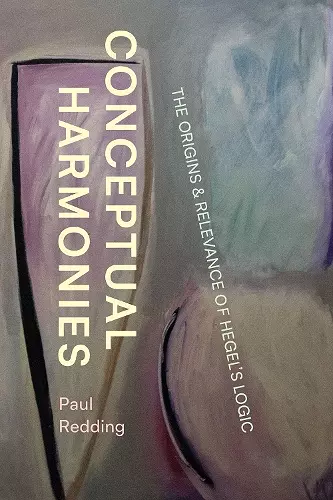Conceptual Harmonies
The Origins and Relevance of Hegel’s Logic
Format:Hardback
Publisher:The University of Chicago Press
Published:16th May '23
Should be back in stock very soon

A new reading of Hegel’s Science of Logic through the history of European mathematics.
Conceptual Harmonies develops an original account of G. W. F. Hegel’s perplexing Science of Logic from a simple insight: philosophical and mathematical thought have shaped each other since classical times. Situating Science of Logic within the rise of modern mathematics, Redding stresses Hegel’s attention to Pythagorean ratios, Platonic reason, and Aristotle’s geometrically inspired logic. He then explores how later traditions shaped Hegel’s world, through both Leibniz and new forms of algebraic geometry. This enlightening reading recovers an overlooked stream in Hegel’s philosophy that remains, Redding argues, important for contemporary conceptions of logic.
"In making his case, Redding places Hegel's discussion of logic and mathematics in a broad historical context, ranging from Plato's academy through Kepler, Newton, Leibniz, Frege, Boole, and Peirce. . . The book will be of interest to Hegel's scholars, not least of all for the challenge it mounts to Robert Brandom's contention that Hegel is best understood within the project of analytic philosophy." * Choice *
"In this book, Paul Redding offers his most comprehensive answer to a question that is at the heart of his work: what is the relationship between Hegelian logic and 'what is commonly called logic?'"
* Archives of Philosophy | Hegelian Bulletin *
"The argument of Conceptual Harmonies is . . . a further, if not definitive, sign that the debate on Hegel’s metaphysics is finally changing." * Journal of Transcendental Philosophy *
"Conceptual Harmonies is the best kind of history of philosophy. In it, Paul Redding uncovers a neglected tradition of Greek mathematics and shows its importance for Hegel’s theory of logical categories. Redding thus finds a new vocabulary in which to paraphrase some of Hegel’s most idiosyncratic formulations, but a vocabulary with a rich history of which Hegel was more aware than are we contemporary readers of him." * Critical Horizons *
“The erudition and scope of Redding’s new book are staggering. This is a very fine book on the history of ancient logic and mathematics and its modern German reception, and it is also a major contribution to Hegel studies and philosophy. We finally have a clear and compelling answer to the question, What did Hegel actually think logic was? Redding has shown us the deep philosophical importance of that answer.” -- Robert B. Pippin, University of Chicago
“Conceptual Harmonies powerfully challenges a long-standing barrier to a full appreciation of Hegel’s logic: the assumption that, given his trenchant critique of all ‘formalisms,’ Hegel’s logic is in no way mathematical. With his characteristic erudition and insight, Redding guides readers through a history of logic and mathematics from Plato to the twentieth century, toward an entirely new understanding of Hegelian logic. Redding’s latest is a must-read for anyone interested in Hegel and the history of logic, proving once again that Redding is one of the most original, rigorous, and historically sensitive interpreters of Hegel writing in any language.” -- Karen Ng, Vanderbilt University
“In Conceptual Harmonies, Redding makes a breathtakingly original case for a new understanding of Hegel’s Logic. Expanding the examination of Hegel’s sources well beyond the standard Aristotelian and Kantian texts, Redding rewrites the history of logic to show that Hegel anticipated many developments in the mid-nineteenth century and beyond. This is a major achievement that opens up a new line of research into Hegel’s though -- Dean Moyar, Johns Hopkins University
ISBN: 9780226826059
Dimensions: 229mm x 152mm x 23mm
Weight: 513g
328 pages